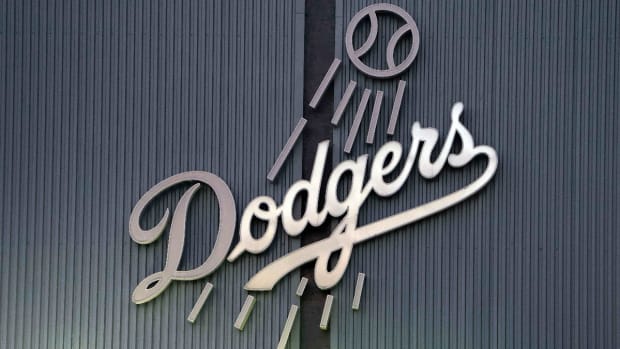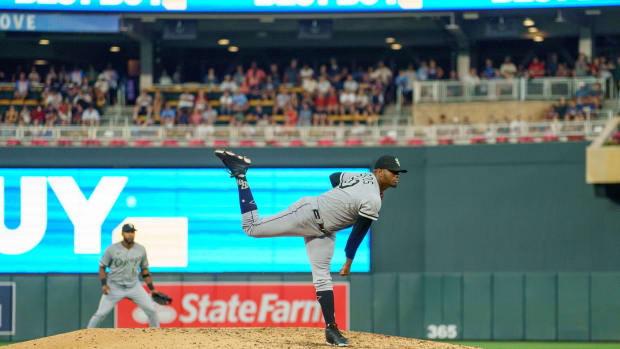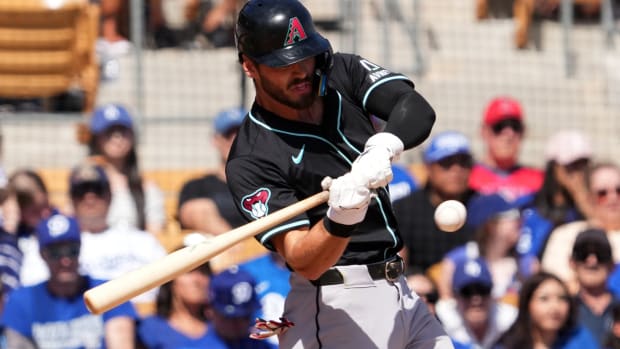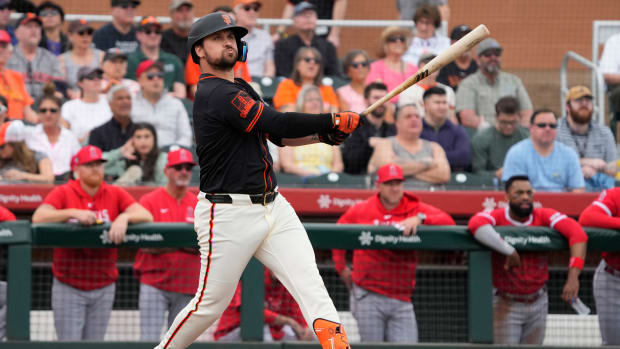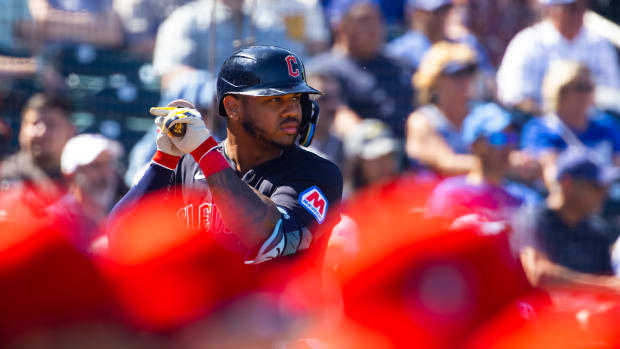
Braves ink Freddie Freeman to franchise-record $135 million, eight-year deal
The Freeman extension is the richest contract in Braves history, far out-stripping the seven-year, $90 million the Braves gave Chipper Jones. (Stephen Dunn/Getty Images)
The Braves settled two of their three high-profile arbitration cases on Thursday, signing outfielder Jason Heyward to a two-year, $13.3 million deal that buys out his two remaining arbitration years and coming to terms with first baseman Freddie Freeman on an eight-year, $135 million extension. The Freeman extension, which was completely unexpected, is the richest contract in Braves history, far out-stripping the seven-year, $90 million the Braves gave Chipper Jones in 2000 just a few months in advance of his free agency, and stands as the 28th richest contract in major-league history.
This is a fascinating confluence of events for a variety of reasons. It was Heyward, the five-tool talent who seemed to arrive in the majors as a full-blown superstar at the age of 20, who was supposed to emerge as Atlanta's franchise player. However, injuries and inconsistency have plagued the rightfielder. Freeman, a parallel prospect who is actually a month younger than Heyward, has shown a more encouraging pattern of growth and improvement in his first three full major-league seasons. Thus, while Heyward was the runner-up for the Rookie of the Year award at age 20 as Freeman was just getting his feet wet in the majors as a September call-up that season, it was Freeman who was clearly the more valuable player in 2013, hitting .319/.396/.501 with 23 home runs and 109 RBI to Heyward's .254/.349/.427 with 14 homers and a mere 38 RBI in just 104 games.
Heyward's injuries in 2013 were flukes (appendicitis and a fractured jaw from a hit-by-pitch), but he has still had just one healthy season in his first four and saw his production drop considerably from 2012 despite the fact that one doesn't use one's appendix or jaw to hit major-league pitching. Heyward's deal will pay him $5.5 million in 2014 ($1 million of that coming via a signing bonus), the exact amount he had filed for in arbitration and just $300,000 more than the Braves' $5.2 million offer, and $7.8 million in 2015.
Freeman, meanwhile, filed for $5.75 million and landed a $135 million deal that buys out five of his free-agent years. It seems pretty clear that the Braves overpaid here. However, just because the Braves paid too much doesn't necessarily mean they won't get their money's worth.
Fangraphs' Dollars statistic, which attempts to convert a player's value in wins above replacement to a market price in free agency, valued Freeman's 2013 season at $23.9 million. The average annual value of Freeman's new contract is $16.875 million. Even if one were to take the average value of his last two seasons according to Dollars, Freeman comes in at $16.1 million, close enough given that he's just about to enter his age-24 season and could continue to improve and gain consistency in his production as he approaches his natural peak in his late twenties.
What's more, Freeman won't turn 32 until the final month of his new contract, so the risk of decline or physical breakdown over the course of the contract is minimal, particularly given that Freeman plays arguably the least demanding position in the game (outside of designated hitter, of course). Eight years may seem like a long time, but in a winter in which 31-year-olds have been signed to seven- and ten-year contracts, eight years for a 24-year-old is a team-friendly contract.
So, Freeman may very well be worth $135 million over the next eight years, but the Braves still overpaid. How's that? Because they had three years worth of leverage over Freeman, who reached arbitration for the first time this winter and wasn't due to become a free agent until after the 2016 season, but wound up paying market price for him.
Consider this: Freeman was asking for $5.75 million in arbitration this year. If you deduct one season at that price from Freeman's extension, the Braves are really paying him $18.5 million over the final seven years of his new deal. But Freeman wasn't going to make $18.5 million next year, either. Let's say he had another great season and got bumped up to $10 million for 2015, a big jump. In that scenario, the Braves just gave Freeman $19.875 million a year for the final six years of this deal, and if you give Freeman another generous assumption of $15 million in his final year of arbitration (by way of comparison, Prince Fielder made $6.5 million, $10.5 million, and $15.5 million in his three arbitration seasons from 2009 to 2011), the Braves just gave Freeman a five-year free-agent contract worth $22.85 million a year. To date, the only first basemen to sign contracts with average annual values as high or higher have been Ryan Howard ($25 million via the Phillies' disastrous extension) and free agents Albert Pujols ($24 million) and Fielder ($23.78 million).
Freeman was due to become a free agent at the age of 27, a year younger than Fielder, but there's no indication that Freeman is likely to put up Fielder-like numbers over the next three years. In Fielder's first three seasons as the Brewers' starting first baseman, he hit .278/.372/.536 while averaging 37 home runs and 101 RBI. Freeman, by comparison, has hit .287/.361/.468 and averaged 23 home runs and 93 RBI over his first three seasons, and there's good reason to believe that his 2013 season was a spike that he'll have trouble repeating.
Freeman actually hit for less power and drew unintentional walks less frequently in 2013 than he did in 2012. The big difference in the two seasons was his batting average on balls in play. In 2013, Freeman hit .371 on fair balls that didn't leave the ballpark, a figure that's almost guaranteed to drop in 2014. From 2001 to 2009, Ichiro Suzuki, the best hitter for batting average of this century, hit .357 on balls in play and surpassed a .371 BABIP just three times in nine years, while Miguel Cabrera has posted a BABIP that high or higher just once in 11 years. Freeman, though certainly capable of hitting for strong averages (he hit .303 in the minors despite graduating to the majors at the tender age of 20), is not going to hit .371 on balls in play very often in his career.
Freeman has power, but he doesn't have great power (he has yet to surpass the 23 home runs he has hit in each of the last two seasons). He'll take walks, but he's not an elite on-base threat (he has thus far topped out at 60 unintentional walks, that coming in 2012). As a .285 hitter (his career average thus far), Freeman might put up a .285/.365/.485 line (an estimate which assumes he'll show more power as he matures, as Freeman has yet to post a .200 isolated slugging in the majors). That's a middle-of-the-order hitter and well above average production even at first base (2013 MLB average: .261/.337/.436), but that's not a superstar, and not a franchise player, not from a player who is merely solid in the field at a position of minimal defensive value.
Now, it's certainly possible that Freeman, who has been very good very young, blossoms into a superstar in his late twenties, but it's equally possible that he has already had his best major-league season. When players are under team control, the uncertainty of ever reaching or sustaining that superstar level long enough to get a nine-figure payday gives their team leverage when negotiating an extension. It's not clear that the Braves benefited from that leverage here, and, having failed to do so, would have been better off waiting to see what Freeman did in 2014, assuming a normalization of his average on balls in play, before striking a long-term deal with their first baseman.
or second-































